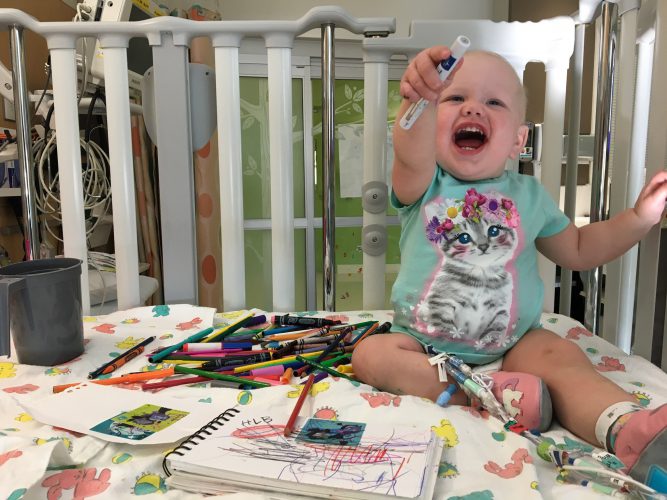
Seattle Children’s doctors and researchers continue to believe chimeric antigen receptor (CAR) T-cell immunotherapy has the power to revolutionize pediatric cancer care. Over the past year, they have made tremendous progress with the promising therapy, which has given patients like Harper Beare, Erin Cross and Milton Wright a second chance at life.
Seattle Children’s recently enrolled its 200th immunotherapy patient, and now has nine T-cell therapy trials targeting childhood cancers from leukemia to solid tumors, which is one of the most robust pipelines in the country.
Seattle Children’s researchers are continuously discovering new best practices based on their experience in the trials, and as a result, will share six abstracts this weekend at the American Society of Hematology (ASH) Annual Meeting in San Diego.
“It’s amazing to be at a place in our research where we’re learning from our existing trials, and immediately incorporating that vital intel into our new trials,” said Dr. Rebecca Gardner, a former oncologist at Seattle Children’s and the principal investigator for the PLAT-02 and PLAT-05 CAR T-cell immunotherapy trials. “We are also pleased to now offer several new trials to patients who would otherwise be out of treatment options. Our goal is to offer the best therapy possible, and to never let any patient reach the end of the line.”
Of the six abstracts that will be presented at ASH, below are some of the key highlights.
Transplant improves remission following CD19 CAR T-cell therapy
Dr. Corinne Summers, an oncologist at Seattle Children’s and principal investigator in the Ben Towne Center For Childhood Cancer Research, will be presenting an abstract about the potential benefit of certain patients receiving a hematopoietic cell transplant (HCT), most commonly known as a bone marrow transplant, following CD19 CAR T-cell therapy.
“We’ve seen excellent initial remission rates from our CD19 CAR T-cell therapy offered in our PLAT-02 trial, but about 50% of patients eventually relapse,” said Summers. “In working to prevent recurrence, we found HCT following T-cell therapy decreased the risk of relapse for patients who did not previously receive a HCT, or for patients who lost their T cells soon after remission.”
Summers and her team found that of the 13 patients who underwent their first HCT following PLAT-02, 12, or more than 90%, remained in remission 20 months after therapy. Of the eight patients who lost durability of their T cells early following PLAT-02 and underwent an HCT, six patients, or about 75%, remained in remission 20 months following therapy.
“These results are very encouraging because they help establish a treatment path for patients who are at the highest risk for relapse to hopefully lead them toward achieving long-term remission,” said Summers.
Boosting T cells increases persistence
Dr. Colleen Annesley, an oncologist at Seattle Children’s and principal investigator for the PLAT-03 trial, will be presenting an abstract showcasing early data that shows how the first-of-its-kind “booster” strategy used in the PLAT-03 trial is effective at increasing the persistence of cancer-fighting CAR T cells.
PLAT-03 is a pilot trial for patients who receive their initial CAR T-cell therapy on PLAT-02. The trial is testing the feasibility and safety of giving a series of one to six “booster” infusions called T cell antigen-presenting cells (T-APCs). The T-APCs have been genetically modified to express the CD19 target for the cancer-fighting CAR T cells to recognize. By episodically stimulating the CAR T cells with target cells to attack, researchers hoped the CAR T cells will re-activate, helping to ensure their persistence long enough to put patients into long-term remission.
Annesley and her team found that of the seven patients who received at least one infusion of T-APCs, none of them experienced any significant toxicity. Five of the patients, who were predicted to lose their T cells, also still had T cells present at least two months after the therapy, with the longest having T cells present after about one year.
“These initial findings about the use of T-APCs are promising as we look for new ways to make reprogrammed CAR T cells last longer, leading patients to long-term remission,” said Annesley.
Targeting CD19 and CD22 appears promising
The researcher also presented an abstract showing initial results from the PLAT-05 trial, which targets CD22 and CD19 on leukemia cells simultaneously.
The data shows that 11 of 14 patients were able to achieve a complete initial remission. While the response rates are similar to the results reported for PLAT-02, the team were particularly impressed to see how patients experienced very mild to no side effects.
“It’s exciting to see that our preliminary analysis of PLAT-05 shows the therapy has great response rates and is very well tolerated in patients,” said Dr. Gartner. “As we continue moving forward with our T-cell immunotherapy trials, incorporating what we’ve learned along the way, we look forward to what we will uncover next as we work to improve this therapy to the point that it leads to a cure.”
If you are interested in supporting the advancement of immunotherapy and cancer research at Seattle Children’s, please visit our donation page.
Resources:
- Two Years Cancer-Free, Erin Advocates for T-Cell Immunotherapy
- Harper Beare is ‘Doing Something Amazing’
- Milton Wright Finds His Way Back ‘Home’
- Fighting for Their Lives: Seattle Children’s Immunotherapy Journey
- Seattle Children’s Cancer and Blood Disorders Center

